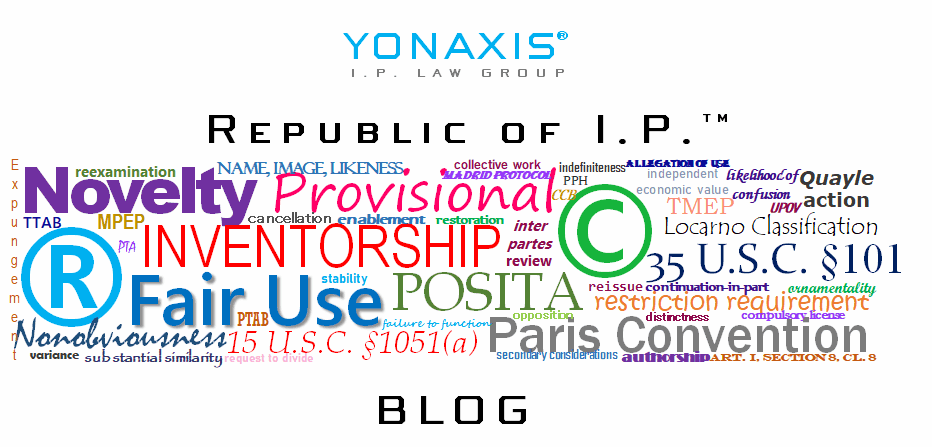Given the current coronavirus pandemic, much has been discussed about possible vaccine trials and antiviral treatments to coronavirus. One patent directed to therapeutic use is U.S. Patent No. 10,695,361 B2 (‘361) issued on June 30, 2020, entitled ”Methods for Treating Arenaviridae and Coronaviridae Virus Infections.” It was issued to inventors Michael O’Neil Hanrahan Clarke, Joy …
Category: trademark
SCOTUS Watch: SCOTUS Finds Adding “.com” to “Booking” Makes it a Non-Generic Registrable Mark
In a major ruling, the U.S. Supreme Court held in U.S.P.T.O. v. Booking.com B.V.,[1] that an otherwise generic mark used in commerce conveys source-identifying characteristics when used with the “.com” top-level domain (TLD). In her majority opinion, Justice Ginsburg opined that since only one domain name owner can hold one particular domain name at any …
U.S. Patent No. D860,048 S – CES Edition
CES 2020 is open January 7 – 10, 2020, in Las Vegas, Nevada, bringing to the world’s eyes gadgets and technology from Big Tech and startups all over the globe. A product that will be shown at CES is the “Drone,” U.S. Patent No. D860,048 S, issued September 17, 2019. The inventors are Christine Caubel, …
U.S. Patent No. D861,266 S – CES Edition
CES 2020 will open January 7 – 10, 2020, in Las Vegas, Nevada, bringing to the world’s eyes gadgets and technology from startups all over the globe. Home appliances are always a popular draw at CES. This year, we spotlight one of these home appliance patents. A product that will be shown at CES is …
Christmas Trademarks & Service Marks
There are several new season-appropriate trademarks and service marks registered this year on the Principal Register by the USPTO. WHITE CHRISTMAS®, on September 10, 2019, in International Class 41, for charitable services, namely, providing toys to needy children. It is a standard character mark. The registrant is Labor of Love Mission of North Tazewell, Virginia. …
SCOTUS Watch: High Court Strikes Down USPTO Attorney’s Fees
On December 11, 2019, the U.S. Supreme Court affirmed the Court of Appeals for the Federal Circuit’s en banc ruling in Peter v. NantKwest, Inc.,[1] holding that the USPTO was not entitled to attorney’s fees under the 35 U.S.C. §145. Our discussion of the Fed Circuit’s en banc opinion, affirmed by the Supreme Court, was …
Trademarks Post-Tam & Brunetti
Two recent U.S. Supreme Court decisions in Matal v. Tam,[1] decided in 2017, and Iancu v. Brunetti,[2] decided this past May, both dealt with registration of trademarks under 15 U.S.C. §1052(a) (§2(a)) that ran afoul of the First Amendment’s freedom of speech clause. 2(a) reads: No trademark by which the goods of the applicant may …
Constitution Day
Today is Constitution Day. On this day, September 17, 1787, the U.S. Constitution was signed thirty-nine Founding Fathers, ushering the birth of the United States. Several clauses in the Constitution have direct import to intellectual property. Article I, Section 8, Clause 8 is the Patent and Copyright Clause, which is the basis of U.S. patent …
Update: USPTO Issues Revised Counsel Rules
On September 5, 2019, the U.S. Patent and Trademark Office issued a revised Examination Guidelines 4-19, “Requirement of U.S.-Licensed Attorney for Foreign-Domiciled Trademark Applicants and Registrants.” The Exam Guidelines 4-19, originally effective on August 3, 2019, were new formal requirements for trademark applications originating by applicants domiciled outside the United States. The rules originally required …
New TM Counsel Rules Creating Problems with Immigration Requirements
The USPTO promulgated new rules on August 3, 2019, requiring foreign entities applying for a trademark registration to retain U.S.-based counsel for filing and prosecution of the trademark application. The new rule specifically requires all trademark applicants to retain a U.S.-admitted attorney to handle all trademark matters before the USPTO. The rule was aimed at …
